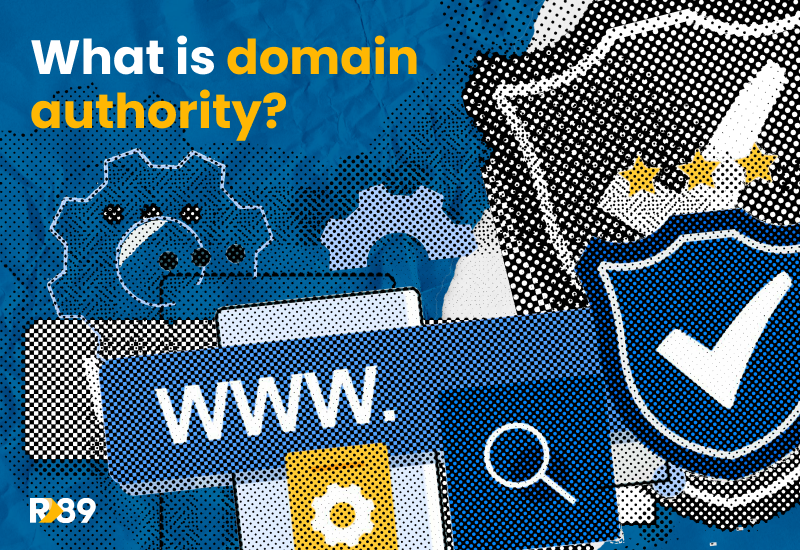On a scale from 1 to 100, how strongly do you think your website outperforms your competition on the search result pages? When you plan your SEO strategy, your Domain Authority score shows how likely you are to rank well on Google.
In this article, we will explain what Domain Authority is. We will also sneak in some tips on how to use it to make your site more visible and boost your traffic!
What is Domain Authority?
Il Domain Authority (DA) score is a rating from 1 to 100 of how likely your website is to rank itself on the search engine results pages, aka the SERPs. The fan-favorite SEO platform, Moz, established it as a comparative metric to evaluate your website’s search performance.
Even though the DA serves to predict if your website is eligible for a high position on the result pages, it’s not a direct ranking factor like your content quality or user experience. For a publisher, the closer your website is to a score of 100, the more credibility you’ll have, and the greater your chances will be of generating more organic traffic.
Why is domain authority important for SEO?
Your domain authority score is important for your SEO strategy. It shows how well you can rank on Google and other search engines.
Having a decent DA is important for anyone who runs a website because it describes your chances of appearing in the first positions of the SERPs, which comes with a perk: higher visibility for your site and therefore more organic traffic and credibility. According to Coursera, these top positions have a CTR of 39%, making it a search result cybernauts don’t tend to miss.
How to check domain authority score
Checking your website’s domain authority is a breeze with the help of SEO tools that give you your score at a glance. You can try using some of the best domain authority checkers such as Moz’s “Free Domain Authority Checker” o SEMrush’s Website Authority Checker to start estimating your site’s SEO strength with useful insights.
What is a good domain authority score?
Determining what counts as a good domain authority score comes down to how your competition or other websites of your industry are doing. Every website starts with a score of 1 and as you up your backlink game with highly trusted websites pointing at your site and overall improve your SEO through content and user experience optimization, then your score will increase.
What affects your domain authority score
One of the main factors that affect your domain authority score is your backlinks. These are links from other websites or platforms that redirect to your site. The more high-quality backlinks your website has from other trustworthy sites endorsing it, the more search engines will know how valuable and credible your content is. That way they will rank it higher.
Other factors such as the quality of your content, your on-page and technical SEO, your website’s structure, and performance can also impact your domain authority score.
Coming right up, we’ll review some tips on you can take to improve your website’s domain authority.
How to increase your domain authority score
As you take actionable steps to optimize your website’s overall SEO strategy, it will also lead to increasing your domain authority score. Let’s see some crucial tasks to help you elevate your DA even higher and meet the benchmarks!
Get back links from sites that have a higher domain authority score
Getting a backlink to your site doesn’t automatically mean it’s a quality one. Focus on getting backlinks from other high-authority websites with a decent score to increase your credibility. You can check other’s domain scores by using any of the free tools we mentioned earlier (Moz e a SEMrush if you need a quick reminder).
Disavow toxic links
As we mentioned above, not every link is worthy of your website. You can use tools like SEMrush to keep track of your backlinks and disavow any harmful links that are impacting your authority score.
Create quality content
Earn sweet backlinks from trusted websites by posting valuable content other sites want to refer to. Having great backlinks redirecting to your site is like saying to Google “Hey! Look at me! You can trust me too!”. This will improve your search engine ranking, build trust, and drive more traffic to your site.
Optimize On-Page SEO
Improve your On-Page SEO enhancing your site’s content and structure for search engines and users to love you. For this you can:
- Write content that matches user intent by doing keyword research.
- Place the keywords strategically, using the correct title tags.
- Optimize meta descriptions, alt texts, and URLs (also with keywords!)
- Work on strategic internal linking.
Run health check-ups of your user experience (UX)
Make sure your website is always running nice and smoothly by conducting regular check-ups of your site’s performance. Search engines will favor a site that loads quickly, works well on mobile, and is easy to use. This will keep your audience engaged.
Avoid black-hat tactics
Forget about cheating the system. When it comes to SEO, it’s better to play by the rules. To rank on the SERPs, you need to be legit, and if you implement Black Hat SEO techniques (also known as unethical SEO practices) that go against the guidelines, Google can heavily penalize you. Never cross Google if you don’t want to reduce your website’s visibility and have your credibility turned to ashes!
Final thoughts
The Domain authority score is a metric that’ll help you draw the strategy to put you on the map. While it is not a direct factor for Google rankings, it is still important.
DA relates to on-page SEO, off-page SEO, and user experience. This information helps to estimate how strong your site is. This strength shows how well your site can rank on the search engine results pages (SERPs). From now on, you can make smart decisions to improve your search results, credibility, and organic traffic.
If you want to learn how to improve your website for better performance and for making money, please reach out to us!








